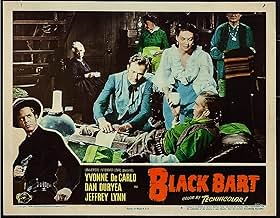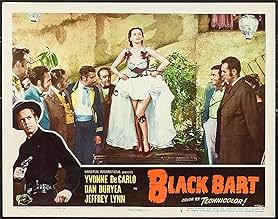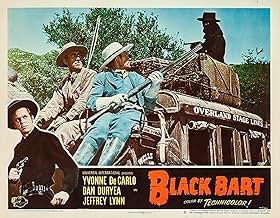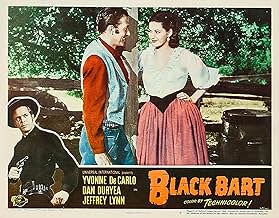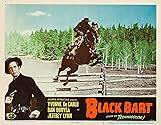IMDb-BEWERTUNG
6,2/10
508
IHRE BEWERTUNG
Füge eine Handlung in deiner Sprache hinzuCalifornia stage robber Black Bart meets European dancer Lola Montez.California stage robber Black Bart meets European dancer Lola Montez.California stage robber Black Bart meets European dancer Lola Montez.
- Auszeichnungen
- 2 wins total
Soledad Jiménez
- Teresa
- (as Soledad Jimenez)
Eddy Waller
- Ed Mason
- (as Eddy C. Waller)
Anne O'Neal
- Mrs. Harmon
- (as Anne O'Neil)
Eddie Acuff
- Elkins
- (Nicht genannt)
Earl Audet
- Townsman
- (Nicht genannt)
William Bailey
- Townsman
- (Nicht genannt)
Ray Bennett
- Henry
- (Nicht genannt)
Nina Campana
- Mamacita
- (Nicht genannt)
Empfohlene Bewertungen
Three thieves in the old west decide to split up their money and go their separate ways. However Lance and Jersey try to double-cross Charlie and leave him. Some time later Lance and Jersey come across Charlie, who appears to be doing well as a rancher. However the mysterious Black Bart is robbing Wells Fargo stagecoaches with help from inside information. Things are complicated by the arrival of the beautiful singer Lola Montes who attracts interest from Lance, Charlie and Black Bart himself.
This is a standard western that never threatens to replace John Ford's westerns at the top of the list of greatest of all time. However it does have plenty of things that make it entertaining to watch. The story is a mix of mystery with some nice twists before the tragic but witty finale. The film never really sags and manages to mix action with romance with humour with western. It's not the best film ever made but it is a gentle bit of entertainment.
Dan Duryea is not great as Charlie - he feels too wooden, and as Black Bart he is totally covered by a mask and can't manage to bring his character to life. Jeffrey Lynn is good as Lance and benefits from having a double act with Percy Kilbride's Jersey. Yvonne DeCarlo is stunning as Lola but she doesn't have much to do and is just part of the studio's habit of adding feisty female roles to westerns of the time.
Overall this is nowhere near a classic but it is well shot and is quite fun.
This is a standard western that never threatens to replace John Ford's westerns at the top of the list of greatest of all time. However it does have plenty of things that make it entertaining to watch. The story is a mix of mystery with some nice twists before the tragic but witty finale. The film never really sags and manages to mix action with romance with humour with western. It's not the best film ever made but it is a gentle bit of entertainment.
Dan Duryea is not great as Charlie - he feels too wooden, and as Black Bart he is totally covered by a mask and can't manage to bring his character to life. Jeffrey Lynn is good as Lance and benefits from having a double act with Percy Kilbride's Jersey. Yvonne DeCarlo is stunning as Lola but she doesn't have much to do and is just part of the studio's habit of adding feisty female roles to westerns of the time.
Overall this is nowhere near a classic but it is well shot and is quite fun.
Three tricky outlaws part ways, only to meet up later on opposite sides.
Pretty good Western— somewhere between an A-production and a B. It's an unusually distinguished supporting cast from Lovejoy to McIntyre to Kilbride, along with some good scenic outdoor set-ups that keep the eye entertained even when the action slows down. Reviewer lorenellroy is right—the amorality of Lynn and Duryea is unusual for the period, 1948. It's hard at times to know where their loyalties lie, making the script somewhat—and refreshingly-- difficult to predict. Add a luscious De Carlo who looks ravishing in Technicolor, while turning in a surprisingly artful performance.
So, with these positives, why doesn't the movie impact more strongly than I believe it does. Now I'm as big a Duryea fan as anyone. In fact that's why I tuned in. But for some reason he looks less motivated than usual, draining Bart of needed character color. There's not the usual relish of his better performances. Add to that the other lead, Jeffrey Lynn, who's just naturally colorless, and there's not the needed drive at the movie's center. At the same time, director Sherman has to work in the romantic angle without sagging the tempo, which he does pretty well. But the staging of the final ambush scene is clumsily done—how could the ambushers miss their shots at such close range as Bart and Lance race for the cabin.
Anyway, there's real offbeat potential in the various ambiguities that the script doesn't develop adequately until the end. Nonetheless, the compensations are enough to make this a generally entertaining 80-minutes of cowboy intrigue.
Pretty good Western— somewhere between an A-production and a B. It's an unusually distinguished supporting cast from Lovejoy to McIntyre to Kilbride, along with some good scenic outdoor set-ups that keep the eye entertained even when the action slows down. Reviewer lorenellroy is right—the amorality of Lynn and Duryea is unusual for the period, 1948. It's hard at times to know where their loyalties lie, making the script somewhat—and refreshingly-- difficult to predict. Add a luscious De Carlo who looks ravishing in Technicolor, while turning in a surprisingly artful performance.
So, with these positives, why doesn't the movie impact more strongly than I believe it does. Now I'm as big a Duryea fan as anyone. In fact that's why I tuned in. But for some reason he looks less motivated than usual, draining Bart of needed character color. There's not the usual relish of his better performances. Add to that the other lead, Jeffrey Lynn, who's just naturally colorless, and there's not the needed drive at the movie's center. At the same time, director Sherman has to work in the romantic angle without sagging the tempo, which he does pretty well. But the staging of the final ambush scene is clumsily done—how could the ambushers miss their shots at such close range as Bart and Lance race for the cabin.
Anyway, there's real offbeat potential in the various ambiguities that the script doesn't develop adequately until the end. Nonetheless, the compensations are enough to make this a generally entertaining 80-minutes of cowboy intrigue.
This film starts with two outlaws by the names of "Charles E. Boles" (Dan Duryea) and "Lance Hardeen" (Jeffrey Lynn) being led to a hanging tree out of town after committing several crimes. However, before the nooses can be put around their necks another outlaw named "Jersey Brady" (Percy Kilbride) ambushes the hanging party and springs his two friends. Once freed Charles decides to split up from the other two and heads for California with all of the money taken from a previous heist. Not long afterward he dons a mask and upon assuming the nickname of "Black Bart" proceeds to rob stagecoaches belonging to Wells Fargo. As luck would have it one of the stagecoaches he robs has both Lance and Jersey as passengers along with a famous dancer from Europe by the name of "Lola Montez" (Yvonne De Carlo). Needless to say, their lives become intertwined from this moment on. Now, rather than reveal any more of the film and risk spoiling it for those who haven't seen it I will just say that this was a watchable Western movie for the most part. Although I liked the performances of Yvonne De Carlo and Percy Kilbride to a certain extent, to be quite honest I didn't think Dan Duryea possessed the necessary screen presence to handle the starring role. Likewise, I also thought some of the scenarios were a bit too fanciful and unrealistic for my tastes. Again though, it's certainly watchable and worth the time spent if one is inclined to movies of this type. I rate it as average.
This film manages to be relatively non-formulaic, and even more non-historical, though the real Black Bart was indeed named Charles E. Boles as portrayed. British-born Boles, however, did not conduct his outlaw career as a Zorroesque black-clad horseman, but hiked to all his holdups and wore a long linen duster, with a flour sack over his head. He was also pushing 50 when he started robbing the stage. So much for a romantic image! If the intention was to make Bart/Boles a dashing figure, I think another actor would have been a better choice than Dan Duryea, who after all pretty much built his career on playing creeps. But it's always interesting to see a departure, and the script is more clever than that of the routine horse opera of the day.
As Lola Montez, Yvonne De Carlo makes no effort at a real characterization of the famous Countess (former mistress to Ludwig I of Bavaria), but acts-- well, like Yvonne De Carlo, delivering her lines in her usual flat New World tones. The witty, volatile and multilingual Lola (nee Eliza Gilbert), though Irish by birth, affected a sort of Spanish accent to go with her assumed Sevillian identity. De Carlo's dancing, I fear, bears little resemblance to Lola's, but it's always a pleasure to watch Yvonne in her early roles; this film came only three years after her dazzling debut in 1945's "Salome, Where She Danced", in which she played a quasi Lola Montez, thereby confusing the record considerably.
In reference to this: the real Lola never danced as Salome nor visited Arizona, and the town there called "Salome, Where She Danced" was named in 1904, and for quite another lady. To play Lola or a quasi-Lola, De Carlo does certainly fit the bill visually as a stunning blue-eyed brunette with a memorable figure. As to Lola ever encountering Black Bart-- well, when he began his career as a highway robber in 1875 Lola had been in her grave for fourteen years. So much for romance!
As Lola Montez, Yvonne De Carlo makes no effort at a real characterization of the famous Countess (former mistress to Ludwig I of Bavaria), but acts-- well, like Yvonne De Carlo, delivering her lines in her usual flat New World tones. The witty, volatile and multilingual Lola (nee Eliza Gilbert), though Irish by birth, affected a sort of Spanish accent to go with her assumed Sevillian identity. De Carlo's dancing, I fear, bears little resemblance to Lola's, but it's always a pleasure to watch Yvonne in her early roles; this film came only three years after her dazzling debut in 1945's "Salome, Where She Danced", in which she played a quasi Lola Montez, thereby confusing the record considerably.
In reference to this: the real Lola never danced as Salome nor visited Arizona, and the town there called "Salome, Where She Danced" was named in 1904, and for quite another lady. To play Lola or a quasi-Lola, De Carlo does certainly fit the bill visually as a stunning blue-eyed brunette with a memorable figure. As to Lola ever encountering Black Bart-- well, when he began his career as a highway robber in 1875 Lola had been in her grave for fourteen years. So much for romance!
This Universal B picture is yet another example of Hollywood taking a famous character of the old west and fashioning their own story about him without a bit of reality to it. All that I can say is that Black Bart did go by the real name of Charles Bolles and they did do his crime thing in California in the 19th century. Other than that this film has nothing to do with Black Bart's real story.
Among other things Black Bart was always a gentleman and left a bit of poetic verse at the scene of each robbery. Not a line of poetry comes from Dan Duryea's lips. As Black Bart died in 1888 and Lola Montez died in 1861 it's highly unlikely they ever even met.
Yvonne DeCarlo plays the exotic dancer who had King Ludwig of Bavaria panting for more. But that's all done with, Lola's in America on a tour and she's now in San Francisco. On the way there she meets up with Black Bart when he holds up the stagecoach. Also along are a pair of Duryea's associates from his past, Jeffrey Lynn and Percy Kilbride. They know Duryea even behind the mask and want in on the set up. Lynn also wants in on Lola Montez.
Black Bart despite its gross historical inaccuracies is an interesting and unique film. No happy endings for anyone here as Duryea and Lynn go out like Butch and Sundance. Yvonne DeCarlo is properly fetching as Lola though I think the one who should have played Lola in a better film of her life should have been Greta Garbo.
Among other things Black Bart was always a gentleman and left a bit of poetic verse at the scene of each robbery. Not a line of poetry comes from Dan Duryea's lips. As Black Bart died in 1888 and Lola Montez died in 1861 it's highly unlikely they ever even met.
Yvonne DeCarlo plays the exotic dancer who had King Ludwig of Bavaria panting for more. But that's all done with, Lola's in America on a tour and she's now in San Francisco. On the way there she meets up with Black Bart when he holds up the stagecoach. Also along are a pair of Duryea's associates from his past, Jeffrey Lynn and Percy Kilbride. They know Duryea even behind the mask and want in on the set up. Lynn also wants in on Lola Montez.
Black Bart despite its gross historical inaccuracies is an interesting and unique film. No happy endings for anyone here as Duryea and Lynn go out like Butch and Sundance. Yvonne DeCarlo is properly fetching as Lola though I think the one who should have played Lola in a better film of her life should have been Greta Garbo.
Wusstest du schon
- WissenswertesFilm debut of Frank Lovejoy.
- PatzerOne of the newspaper columns (c. 1849) mentions automobiles.
- Zitate
Clark: I've got an idea that's bigger than anything you've ever heard. It'll take time... and it'll take brains.
Charles E. Boles: I got plenty of time.
- VerbindungenReferenced in Mystery Science Theater 3000: The Phantom Planet (1998)
Top-Auswahl
Melde dich zum Bewerten an und greife auf die Watchlist für personalisierte Empfehlungen zu.
Details
- Erscheinungsdatum
- Herkunftsland
- Sprache
- Auch bekannt als
- Black Bart, Highwayman
- Drehorte
- Produktionsfirma
- Weitere beteiligte Unternehmen bei IMDbPro anzeigen
- Laufzeit
- 1 Std. 20 Min.(80 min)
- Seitenverhältnis
- 1.37 : 1
Zu dieser Seite beitragen
Bearbeitung vorschlagen oder fehlenden Inhalt hinzufügen


